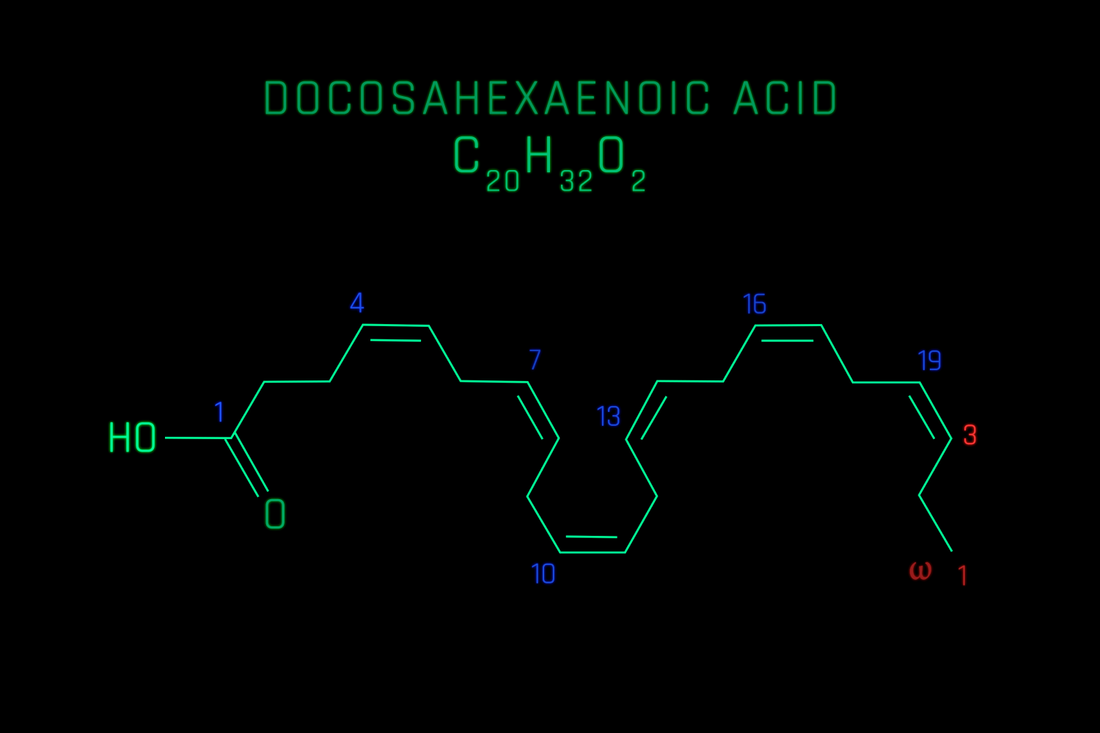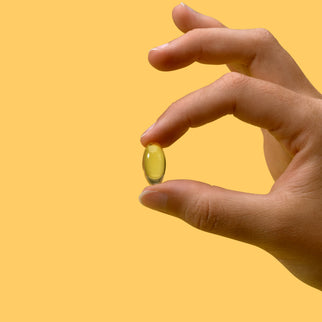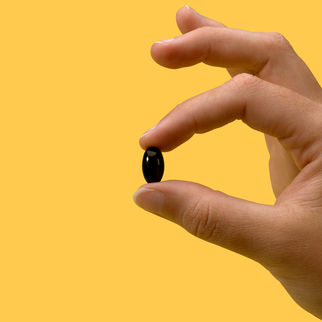You have probably heard that you should include more omega-3s in your diet, but you might not know exactly what omega-3s are. Docosahexaenoic acid (DHA) is one of the main types of omega-3s, and it offers many potential health benefits
Understanding what DHA is and why it is beneficial helps us remember to consume it regularly. Unlike many other nutrients that are so common in a standard diet that it’s hard to become deficient, if you are not mindful of your DHA intake, you likely won’t get enough to keep up with your recommended daily needs.
Fortunately, this guide will provide you with everything you need to know about what DHA is, why you should be consuming it daily, and how you can include it in your diet.
What Is Docosahexaenoic Acid?

Docosahexaenoic acid (DHA) is a type of long-chain omega-3 fatty acid found in the body. Omega-3 fatty acids are types of polyunsaturated fatty acids that form the building blocks of cell membranes. By serving as an important component of cell membranes, omega-3s help to influence how cells communicate with each other and, therefore, influence the function of many bodily systems.
DHA is an important nutrient in the body, influencing systems from the eyes to the joints. Because DHA is an essential nutrient, you must be mindful of how you obtain it. There are two key ways that your body obtains DHA omega-3s. The first way your body gets DHA is by converting it from another omega-3, called alpha-linolenic acid (ALA).
ALA acts as a precursor to long-chain omega-3s as the body converts it into DHA and another long-chain omega-3, eicosapentaenoic acid (EPA). However, ALA does not convert effectively enough to give you the long-chain fatty acids you need.
In fact, studies have shown that the body converts less than 4% of ALA into DHA in men and only about 9% in women. Because these conversions are so inefficient, it is crucial that you obtain DHA through the second method — eating it through food or dietary supplements. Experts recommend you obtain at least 250-500mg of the nutrient daily.
What Are the Benefits of DHA?
Although DHA is less common in our daily foods, it still has a wide range of potential benefits for our health that make it an underrated nutrient. Making a conscious effort to obtain DHA omega-3s in our diet can lead to several possible positive health outcomes. The following are some of the most important benefits of DHA.
May Maintain Triglyceride Levels Already Within the Healthy Range
Triglycerides are one of several types of blood lipids in your body, and they are a main component of body fat — in fact, triglycerides are the most common type of fat in the body.
Triglycerides can come from foods you eat, like butters, oils, and other high-fat food options, but they can also come more generally from an intake of excess calories.
When you consume more calories than you need, your body works to store the extra calories as fat by turning them into triglycerides. Some body fat and triglycerides are necessary for your body to use for energy, but high levels of triglycerides can raise your risk of certain health concerns.
Research shows that DHA may be able to help your body maintain triglyceride levels that are already within the healthy range,
May Support Overall Cognitive Function
As we age, the brain becomes more susceptible to cognitive decreases and reduced performance in learning and memory. Reduced cognitive function correlates with lower levels of DHA and EPA in the brain tissues. As a result, DHA may be an important supplement to support sustained healthy cognitive function in older adults.
Studies show that DHA may work to maintain brain health — even as you age — which in turn helps support focus and concentration.
May Support a Healthy Pregnancy

Taking DHA during pregnancy has demonstrated several potential benefits. First, since DHA makes up a foundational building block of cells in the brain and the eyes, it serves as a crucial nutrient when these two systems are developing.
Second, in conjunction with EPA, DHA supplementation during pregnancy may help support a healthy pregnancy term. Studies have shown a correlation between DHA and EPA intake in pregnant women and a healthy gestation period. These results demonstrate that the nutrients may support an optimal length of pregnancy.
Because of its important role in supporting fetal development, DHA is a foundational part of prenatal vitamins. Experts recommend supplementing with a DHA-rich prenatal vitamin starting before conception and on through the entire breastfeeding process.
DHA is not only important for the baby during pregnancy, but it can also help support the health of the mother, helping to promote emotional wellness even after birth.
May Support Brain Health and Cognitive Development
Throughout pregnancy, DHA helps to support the development of the brain and nervous system, but this may have even more profound effects. The benefits of taking DHA during pregnancy may even extend as far as promoting a child's cognitive development and function after birth. In studies, children whose mothers supplemented with DHA during pregnancy demonstrated strong problem-solving skills than children whose mothers did not.
Another study showed similar findings, demonstrating that children showed strong performance in terms of mental development after receiving DHA supplementation.
DHA's benefits on brain function likely continue throughout childhood and into aging. As a result, it is crucial to maintain adequate amounts of DHA in your daily diet.
May Support Growth and Development in Children
A healthy intake of DHA does not stop being important once a baby is born. DHA plays an important role in supporting growth and development throughout childhood. With its role as a building block for cells in the brain and in the eyes, DHA promotes the healthy development of these two systems as a child grows.
As a result, mothers should generally continue to supplement additional DHA daily during breastfeeding. Obtaining adequate amounts of DHA even after birth helps pass more of the nutrient onto the baby. Even after a child outgrows the breastfeeding process, the child should still consume DHA through diet or supplementation as they continue to grow into adolescence and beyond.
May Support Healthy Eyes
At this point, we know that DHA plays an essential part in the development of the eyes during gestation and after birth. However, DHA continues to form a key part of cells in the retina throughout our whole lives, not just in childhood. As a building block of retinal cells, DHA has a crucial role in supporting eye health.
Some studies have shown that DHA may be able to help maintain healthy vision as we age. Although more studies are necessary, there are some promising results so far.
In addition, DHA has also demonstrated the ability to support tear production in the eyes and provide benefits for those who experience dry eyes. Tear production is important for supporting unobstructed vision and maintaining comfort in the eye.
May Promote Emotional Wellness
Taking DHA may have positive effects on supporting a more positive mood. Higher concentrations of DHA in the brain have been associated with positive outcomes on emotional wellness.
Research on the effects of omega-3 fatty acids shows that DHA intake may support overall emotional wellness. These potential benefits may also support emotional wellness for women after pregnancy.
What Are the Differences Between EPA and DHA?

Although EPA and DHA often work together in supporting many different bodily systems, there are still important differences between how they function and work within the body. These differences may largely be driven by the physical shape of the two fats. DHA has a longer carbon chain, which means that it takes up more space in cell membranes and interacts differently with its environment.
This difference in shape is the reason that DHA is better able to support the transfer of signals in the eye, with its longer chain to transport messages. However, DHA’s larger size is the same reason it is less effective in inhibiting certain enzymes and balancing signaling molecule levels.
What Are Good Sources of DHA?
Because DHA is not converted effectively by the body, you need to get it through food or supplementation. However, this is often easier said than done because there are not many sources of the nutrient in a standard diet, making it difficult to get enough DHA on a daily basis.
The most common dietary source of DHA is oily, fatty fish. Cold-water fish like mackerel, sardines, and salmon all provide great options. Eating these cold-water fish provides a combination of DHA and EPA omega-3s. Experts recommend eating fish at least twice a week to obtain your daily recommended intake of both fatty acids.
For many, cooking fish twice a week may be inconvenient or time-consuming. Therefore, many people turn to fish or krill oil supplements for a quicker and easier way to obtain EPA and DHA.
Unfortunately, fish and fish oil supplements come with their own drawbacks and potential side effects. Most notably, not everyone can eat fish due to allergies, lifestyle choices, or a general dislike for the fishy burps that come with the taste and smell of fish.
On the bright side, algae provides another excellent source of combined DHA and EPA omega-3s, and it is an excellent alternative to fish and fish oil. Not only is this supplement entirely plant-based and excellent for any lifestyle, but it is also more easily absorbed by the body compared to options like fish and krill oil. Since the omega-3s in algae have a 1.7x higher absorption rate than those in fish or krill oil, the nutrients are able to be put to use more quickly and more efficiently by the body.
Due to the nature of the omega-3 content in algae, it is easier to isolate the types of fatty acids for your specific health needs. If you are looking for a supplement that prioritizes DHA over EPA, iwi life can help, offering a high-quality DHA-specific omega-3 supplement to help you achieve your health goals. Talk to your healthcare provider and see if adding an omega-3 supplement to your diet is a good idea.
Enhance Your DHA Intake for Overall Wellness
DHA is an essential nutrient that provides many potential health benefits and supports several crucial systems in the body. Unfortunately, it is easy to miss out on if you are not mindful about including it in your diet. Thankfully, the right supplement can make all the difference.
If you are looking for a supplement that provides the benefits of DHA more than EPA, then you can turn to an iwi life DHA supplement for a daily 250mg of the important nutrient. Try our DHA supplement for yourself and see how you can support your overall health and wellness with just one simple soft gel a day.
Sources:
DHA Effects in Brain Development and Function | PMC
Omega-3 Fatty Acids and Pregnancy | PMC
Omega-3 for your eyes | Harvard Health
Eyes and Nutrition | Optometrists.org
Docosahexaenoic Acid and Cognition throughout the Lifespan | PMC





















